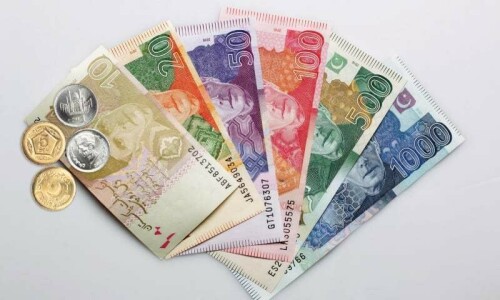KARACHI: In the first auction of the treasury bills (T-bills) after the State Bank of Pakistan (SBP) cut its policy rate in nearly four years early this month, the government on Wednesday exceeded its auction target by 72 per cent at slightly reduced cut-off yields.
The SBP brought down its policy rate by a meagre 150 basis points to 20.5pc on June 10 after keeping it at an unprecedented level of 22pc for almost a year. The market was expecting a bigger cut as the inflation decelerated to 11.8pc in May.
However, the government kept the cut-off yield on 3-month T-bills unchanged at 20.14pc while reducing the rate by just one basis point to 19.96pc for six-month papers and 41bps to 18.54pc for 12-month papers.
However, the bid pattern showed that the banks were eagerly willing to park maximum liquidity in long-term papers as they anticipate further easing the interest in the coming months.
The investors offered bids of Rs997.2 billion for six-month T-bills, and the government raised Rs446.6bn, the highest amount for any tenor in the auction.
The government raised just Rs79.6bn for three-month papers against the lowest bids of Rs236.7bn. The investors were willing to purchase 12-month T-bills for Rs 448.9 bn, but the government picked only Rs 200 bn.
However, the government borrowed Rs776.7bn against the target of Rs450bn set for this auction; it was 72 per cent higher.
The government’s borrowing from banks during the outgoing fiscal year has already exceeded all previous records.
The latest data issued by the State Bank on Wednesday showed that the government borrowed Rs7.765tr from banks till June 14 compared to Rs4.374tr in the corresponding period last year.
The borrowing in FY24 is more than the combined figure of the preceding two fiscal years.
The government’s borrowing speed reflects its high spending, particularly after generating 30pc more revenue this year. Relying on banks for budget financing proved extremely costly, as the government would have to spend the entire tax money on debt servicing.
Almost all banks have earned huge profits, and most of them doubled their earnings in the calendar year 2023. This was possible due to maximum lending to the government.
Analysts said the rush for long-term T-bills indicated the interest rate would come down in the coming months, and banks were putting in maximum money for higher yields.
The situation is supportive for the banking sector but damaging for the economy, as the private sector is sitting idle because the high cost of borrowing has pushed up the cost of doing business to an unsustainable level, they said.
They added that inflation slowed to 11.8pc in May, but the latest budget measures could fuel the inflation, and interest may stay at a higher level, which is unsuitable for the economy.
Almost all exporters and the construction industry have published appeals in the newspapers to save them from budgetary measures or face shutdown.
Published in Dawn, June 27th, 2024













































Dear visitor, the comments section is undergoing an overhaul and will return soon.